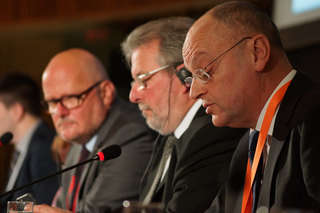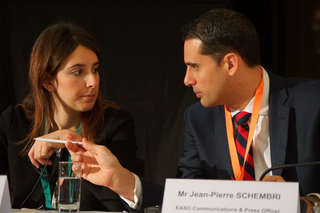Representatives of EU Member States' national parliaments met in Luxembourg for the 54th Conference of Parliamentary Committees for Union Affairs of Parliaments of the European Union (COSAC), which took place on 30 November and 1 December 2015. Chaired by Marc Angel, Chair of the Committee on Foreign and European Affairs, Defence, Cooperation and Immigration in the Luxembourg Chamber of Deputies, the debates focused on the European agenda on migration, the strategy for a digital market in Europe, and lastly, EU enlargement policy.
For the first session devoted to the European agenda on migration, the debates specifically concentrated on common asylum policy and legal migration policy, as well as the fight against illegal migration and external borders security.
During the debates, an overwhelming majority of speakers stressed the importance of solidarity between EU Member States to respond to challenges linked to the refugees crisis.
For Marc Angel and Mars Di Bartolomeo, the European response to the refugees crisis cannot be 'that of a fortress Europe'
'More than ever, solidarity must be shown and cooperation between Member States must be stepped up', said Marc Angel in his introductory speech, before stressing the need to avoid confusing refugees with terrorists. Mars Di Bartolomeo, President of the Luxembourg Chamber of Deputies, echoed the sentiment, pointing out that the refugees were themselves victims of terrorism.
Both then highlighted the fact that the European response to the refugees crisis cannot be 'that of fortress Europe'. As for the reintroduction by some Member States of temporary border controls, Marc Angel pointed out that such controls 'do not mean the death of the Schengen area'. He nevertheless stated that the Schengen agreements should not be jeopardised 'on any account', before calling for external protection of the Schengen area to be reinforced.
The common asylum policy and legal migration policy
 Gaston Stronck, Director for International Economic Relations and European Affairs at the Luxembourg Ministry of Foreign and European Affairs, emphasised the need for closer coordination among the different players involved (the Commission, Member States, non-EU countries and organisations) to deal with 'unprecedented migratory pressure'. 'European policy should maintain a set course while addressing problems in the short and long term', he said.
Gaston Stronck, Director for International Economic Relations and European Affairs at the Luxembourg Ministry of Foreign and European Affairs, emphasised the need for closer coordination among the different players involved (the Commission, Member States, non-EU countries and organisations) to deal with 'unprecedented migratory pressure'. 'European policy should maintain a set course while addressing problems in the short and long term', he said.
According to him, the different measures taken at a European level 'are still not enough given the scale of the migration phenomenon'. Furthermore, the unilateral and individual measures of some Member States have proved, without major exceptions, counter-productive, he said, calling for a spirit of coordination, cooperation and solidarity. According to him, the control of migration flows 'cannot be limited to European solutions' and capacity building is 'inevitable'. This is why the Union is 'ready to step up its efforts on international cooperation in order to support countries of origin and transit'.
Gaston Stronck emphasised the need to find 'a balance between immigration and return'. According to him, the JHA Council of 8 October enabled a 'new policy of return and readmission' to be reached which 'should play a fundamental role in the future'. He also called for existing rules to be enforced and asylum system abuses to be limited. For the Director, enhancing the Frontex mandate is essential, in particular by setting up a 'return office'.
As for the mechanism to relocate 160 000 asylum seekers, adopted by qualified majority in September, Gaston Stronck reckoned that relocation is 'intrinsically linked to the smooth workings of hotspots', as these first reception and registration arrangements enable an initial sorting process to be carried out, identifying and registering migrants and taking their fingerprints. He welcomed the 'considerable work' of the Greek and Italian services in the two hotspots to date operating in these two countries, inviting Member States to deploy the necessary personnel on the ground to enable them to function.
Gaston Stronck reckoned that securing EU external borders must be 'adapted and developed in harmony with current and future challenges', recalling that the European Commission will propose a 'Borders package' in the months to come.
Gaston Stronck also stressed that boosting reception capacities at the points of entry into Europe, as well as along the Balkans route, is a 'crucial priority', in particular with the onset of winter, for 'the EU cannot permit people to be left to die of the cold while looking for refuge'. A summit called by the President of the Commission, Jean-Claude Juncker, allowed for a total of 100 000 additional refugee places.
In reference to the EU-Turkey Summit which took place on 29 November 2015, Gaston Stronck also said that 'without Turkey, solutions will be difficult to envisage', as this country accommodates 2.2 million refugees.
Laura Ferrara stresses the need to set up 'safe legal alternatives to illegal immigration'
 Referring to the increase in the number of applications for international protection in 2015, Italian MEP Laura Ferrara (EFDD), member of the European Parliament's Committee on Civil Liberties, Justice and Home Affairs (LIBE), thought that the EU should step up its efforts to address the migration crisis. In the short term, this involves coping with emergency situations, through a 'common' approach and with 'solidarity'. In the medium and long term, the EU should, according to her, adapt the Dublin III Regulation, which is experiencing 'unprecedented pressure'. In her view, the conditions and mechanisms for determining which states are responsible for processing a request for asylum should be reviewed to provide 'more shared responsibility between Member States'.
Referring to the increase in the number of applications for international protection in 2015, Italian MEP Laura Ferrara (EFDD), member of the European Parliament's Committee on Civil Liberties, Justice and Home Affairs (LIBE), thought that the EU should step up its efforts to address the migration crisis. In the short term, this involves coping with emergency situations, through a 'common' approach and with 'solidarity'. In the medium and long term, the EU should, according to her, adapt the Dublin III Regulation, which is experiencing 'unprecedented pressure'. In her view, the conditions and mechanisms for determining which states are responsible for processing a request for asylum should be reviewed to provide 'more shared responsibility between Member States'.
Laura Ferrara furthermore stressed the need to set up 'safe legal alternatives to illegal immigration', otherwise, migrants will continue to take risks, opting for dangerous routes in which they are often the victims of human trafficking and sexual exploitation. She nevertheless pointed out that 'this type of solution is not unanimous within the European Parliament'.
Finally, the MEP stressed the need to 'review economic, trade and energy policies' to tackle the 'causes of these waves of migration'.
Jean-Pierre Schembri, a member of the European Asylum Support Office (EASO), presented several statistics regarding asylum. 176 000 applications for asylum have been made to the EU in October 2015, 2.4 times more than in October 2014. For non-accompanied minors, this figure had multiplied by five in October 2015 compared with October 2014. One-third of non-accompanied minors have been received in Sweden, followed by Austria and Germany.
Furthermore, by October 2015, one million applications for asylum had been made since the start of the year, whereas 662 000 requests were made during the first ten months of the previous year. Germany and the Scandinavian countries were the main destinations for these migrants.
Regarding delays in the processing of applicants, Jean-Pierre Schembri indicated that 29 % of applicants waited more than 6 months, and that currently, 900 000 files are delayed in the EU. Syrians and Afghans are the nationalities most affected by these delays.
Jean-Pierre Schembri lastly highlighted the importance of 'making hotspots work' so that the number of people benefiting from relocation could increase. Laura Ferrara had mentioned earlier the fewer than 200 people relocated in November, whereas 120 000 people should be relocated by the end of 2016.
The fight against illegal migration and external borders security
Michele Bordo, Chairman of the European Affairs Committee in the Italian Chamber of Deputies, reckoned that closing the borders of the Union alone would not suffice in making it more secure or put an end to the migration phenomenon. According to him, Europe is facing a structural crisis which requires a common European response. If the Member States agreed to set up hotspots, they should also accept the principle of refugee relocation, he insisted, calling on Member States to decide on a common management for the problem now and not to sit back and leave it just to the Member States on the front line.
'Member States should not bail out of their duties', he added, before emphasising the need to cooperate with transit countries and to make the Mediterranean 'an opportunity for growth'. Building walls will not solve this crisis, he stated, stressing that Europe symbolised the tearing down of walls, not the opposite.
Rear Admiral Hervé Bléjean, Deputy Commander of the EUNAVFOR MED operation, reviewed the operation launched on 22 June 2015. The operation which aims to identify, capture and dispose of vessels and resources used by migrant smugglers led to the arrest of 43 human traffickers and the destruction of 46 boats. Hervé Bléjean pointed out that although this is not a rescue operation, EUNAFVOR MED was able to save the lives of 5 723 people.
The Rear Admiral then presented a table showing the migrant routes to Europe. In 2015, the vast majority of migrants (79 % or 580 305 people) entered the EU via the Balkans route, up more than 1 451 % on 2014. Of these, over 60 % came from Syria, 23 % from Afghanistan, and 8 % from Iraq. Regarding the flow of migrants from the Libyan coast, this figure rose to 143 308 in 2015 and is 8 % down on 2014. Of these migrants, the majority came from Eritrea (24 %), while there were only a few people from Syria (4 %).
Hervé Bléjean stressed the importance of trade based on illegal migration for the Libyan economy which, according to him, represents around one-third of revenues, making up 50 % of revenues for some coastal towns. He believes that smugglers have 'adapted' to the new situation: 'No boat reaches Italy on its own steam', since traffickers use less fuel, Hervé Bléjean remarked.

